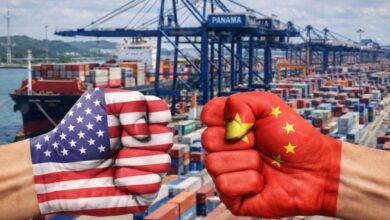U.S. Agents Battle Hidden Drug Mexico-China Networks

As fentanyl floods the U.S., DEA agents discover Chinese criminal groups laundering cartel money and dominating the illegal marijuana trade, raising national security concerns. NBC News interviews reveal the extent of this unprecedented challenge. This article is adapted from NBC News’ report.
Ray Donovan, a seasoned federal drug agent, had spent years pursuing the notorious Mexican cartel boss Joaquin “El Chapo” Guzman. When Guzman was finally apprehended in early 2014, Donovan thought he could catch his breath. But a new and unexpected challenge was already on the horizon: the rapid and insidious rise of fentanyl trafficking in the United States.
In his quest to dismantle the burgeoning fentanyl networks, Donovan sought the expertise of a data scientist to map out the connections. The results were startling. Reviewing the telephone records of suspected traffickers revealed a pattern that pointed unmistakably to China.
“A ton of calls to China,” Michael Mezner, one of the DEA agents on Donovan’s team, recalled in an interview with NBC News. “I looked at that data from every way, and I went to the data guy and told him, ‘I don’t know what’s going on here, but I’ve never seen anything like this in my life.'” The shock and concern in his voice were palpable, reflecting the gravity of the situation.
This new pattern revealed that Chinese criminal groups were laundering drug money for Mexican cartels on a scale that no one had anticipated. The realization came in 2015, but Donovan’s attention was momentarily diverted when El Chapo escaped prison. By the time Guzman was recaptured in 2016, the DEA team had uncovered another alarming trend: the same Chinese brokers were heavily involved in marijuana trafficking across the United States.
“That was an eye-opening moment,” Donovan said, reflecting on how these revelations reshaped their understanding of the international drug trade. The impact of these discoveries was profound, changing the way they approached their mission.
The implications of these findings were profound. Over the past decade, Chinese organized crime groups in the U.S. have quietly become the dominant money launderers for Mexican cartels. With their growing profits, these groups took control of the illicit marijuana market just as U.S. states began relaxing their cannabis laws.
Christopher Urben, a former assistant special agent in charge at the DEA’s Special Operations Division in Virginia, described this dual revenue stream as unbeatable. “They’ve created within the United States, I hate to say it, this super cartel organized crime force,” he told NBC News.
The exponential growth of the Chinese laundering system has significantly boosted the profits of the two major Mexican cartels responsible for the fentanyl crisis in the U.S.—the Sinaloa and the Jalisco New Generation Cartel (CJNG). Experts and U.S. lawmakers are raising national security concerns over the vast money involved.
Chinese criminal syndicates, often operating with the tacit support of China’s intelligence services, pose an additional threat. Some current and former U.S. officials worry that portions of the illicit drug proceeds might be used for harmful activities in the U.S., such as corporate espionage or election interference.
Dennis Wilder, a former CIA officer, and China expert emphasized the need for thorough investigations into whether some of this illicit cash is funneling into China’s powerful Ministry of State Security. “Obviously this has been neglected in the U.S. government,” Wilder said in an interview with NBC News. “It needs attention.”
Efforts to stem the tide of Chinese money laundering have faced significant challenges. Urban and other former DEA agents recounted their unsuccessful attempts to rally government resources. The complexity of penetrating these financial networks requires extensive time, workforce, and political will, all of which have been in short supply.
Despite the urgency, law enforcement has primarily focused on busting fentanyl traffickers rather than dismantling the underground financial networks that sustain them. “We’ve let this happen,” Urben lamented.
Since 2023, federal prosecutors have charged at least 31 individuals linked to Chinese groups accused of laundering cartel drug money. However, these cases represent only a fraction of the problem. Thousands of Chinese money brokers are believed to be operating across the U.S.
Bill Bodner, the former head of the DEA’s Los Angeles division, expressed concern over the lack of visibility into these networks. “Is there more to the story that most of us don’t know yet?” he told NBC News.
Project Sleeping Giant
Chinese criminal groups have maintained a low profile in the U.S. for decades, engaging in non-violent criminal activities such as wildlife trafficking and cybercrime. Their recent partnerships with Latin American drug trafficking organizations, however, have propelled them to the forefront of global money laundering operations.
Vanda Felbab-Brown, a senior fellow at the Brookings Institution, noted the rapid rise of these groups. “It’s striking how rapidly that rise has taken place,” she said in an interview with NBC News.
In response, the DEA’s elite Special Operations Division launched Project Sleeping Giant in 2018, aiming to target Chinese-linked drug activity and money laundering. The initiative brought together multiple government agencies to tackle the complex issue.
Investigations revealed that Chinese money brokers involved in fentanyl sales operated in major cities like New York, Los Angeles, Chicago, and Miami. The laundering process began with cartel associates dropping off cash from fentanyl sales to Chinese money brokers in the U.S. These brokers then facilitated the cartels’ access to pesos or cryptocurrency in Mexico through a sophisticated system of informal trade and mirror transactions.
A vital component of this system involves wealthy Chinese nationals seeking to move money out of China, circumventing the government-imposed $50,000 limit on international transfers. Chinese brokers maintain a steady cash flow for cartel operations while profiting handsomely by selling U.S. dollars at a premium to these individuals.
“This system doesn’t involve physically transporting cash across borders,” Urben explained to NBC News. “It’s safer, faster, and cheaper than other laundering methods.”
From 2018 to 2020, DEA data scientists and analysts meticulously mapped the Chinese money laundering networks, identifying suspects nationwide. Most were loosely connected to a neighborhood in Queens, New York. “All roads lead back to Flushing,” Urben noted.
Plans to target over 100 money launderers in 12 cities were underway when the Covid pandemic struck, shifting law enforcement focus to the spike in fentanyl deaths. “Money cases were not as much a priority as fentanyl cases,” said Donald Im, a retired DEA assistant special agent who had designed the operation.
Former CIA officer John Cassara, an expert in transnational money laundering, criticized this shift in priorities. “It’s easier to go after the product and the people than the money,” he told NBC News. “But that’s a huge mistake.”
The Cannabis Connection
Before the pandemic, investigators stumbled upon another startling discovery: Chinese money laundering groups were heavily involved in the marijuana trade. Agents found that brokers in New York were buying homes in states like Colorado and California to grow marijuana and distribute it across the country.
However, federal law enforcement’s hands were tied. Since 2013, the Justice Department has primarily discouraged prosecuting marijuana cases in states where it was legalized, leaving a vacuum for Chinese criminal groups to fill.
“They opened up Pandora’s box,” Donovan said.
As Mexican cartels shifted focus to more profitable hard drugs, Chinese groups took over the marijuana industry, operating grow sites in at least 23 states. The DEA reported that proceeds from marijuana sales funded other criminal activities, including human trafficking.
Oklahoma emerged as a significant hub due to its lenient medical marijuana laws and affordable land. Authorities have shut down over 3,000 illegal farms, with up to 90% linked to Chinese organized crime. Recent busts in Maine further highlight the widespread nature of this operation.
The retired DEA agents emphasized that neglecting marijuana prosecutions deprived them of a crucial tool to disrupt these criminal networks. “The marijuana side is an opportunity we’re not taking advantage of,” Urben said.
National Security Concerns
Sen. Susan Collins of Maine voiced her suspicions about the Chinese government’s involvement in criminal activities in her state. While FBI Director Christopher Wray testified that direct ties to the Chinese government were not found, investigations continue.
A report by the House Committee on the Chinese Communist Party suggested that China subsidizes the production of illegal narcotics for export to the U.S. Rep. John Moolenaar, chair of the bipartisan committee, also pointed to the Chinese government’s role in enabling these criminal enterprises.
However, experts like Wilder argue that while the Chinese government doesn’t directly control overseas criminal groups, some officials protect and benefit from their activities. “This is about Chinese corruption,” he said, stressing the need for intelligence agencies to investigate potential threats to U.S. security.
In response to U.S. concerns, Chinese Embassy spokesperson Liu Pengyu claimed that Beijing has cooperated with U.S. anti-money laundering efforts, citing recent progress. However, U.S. officials have long criticized China’s lack of cooperation in curtailing the drug trade.
Recent Developments and Challenges
Despite these challenges, there have been recent successes. In June, federal prosecutors in California indicted 24 people, including nine Chinese nationals, for laundering $50 million for the Sinaloa cartel. Among those indicted, Peiji Tong was arrested by Chinese authorities after fleeing the U.S.
The DEA has made significant bulk cash seizures tied to Chinese networks in at least 20 states. However, the complexity of penetrating these networks remains a significant hurdle, exacerbated by a shortage of Mandarin speakers in federal law enforcement and the encrypted nature of communication platforms like WeChat.
The spokesperson for WeChat’s parent company, Tencent, emphasized their commitment to user safety and cooperation with authorities. However, former DEA agents stress that dismantling these networks requires a coordinated, long-term approach that has yet to be fully implemented.
“It’s just like Italian organized crime from 30 years ago,” Urben said, recalling his work against the mafia. “This could all be resolved if we had the political and economic will, and we don’t.”
Also read: Cartel Monster Trucks and Mexico’s Battle Against Armored Warfare
The fight against Chinese money laundering and its far-reaching implications for national security is ongoing. As fentanyl continues to devastate communities and Chinese criminal groups expand their reach, U.S. authorities face an uphill battle to dismantle these intricate networks and safeguard national security.




